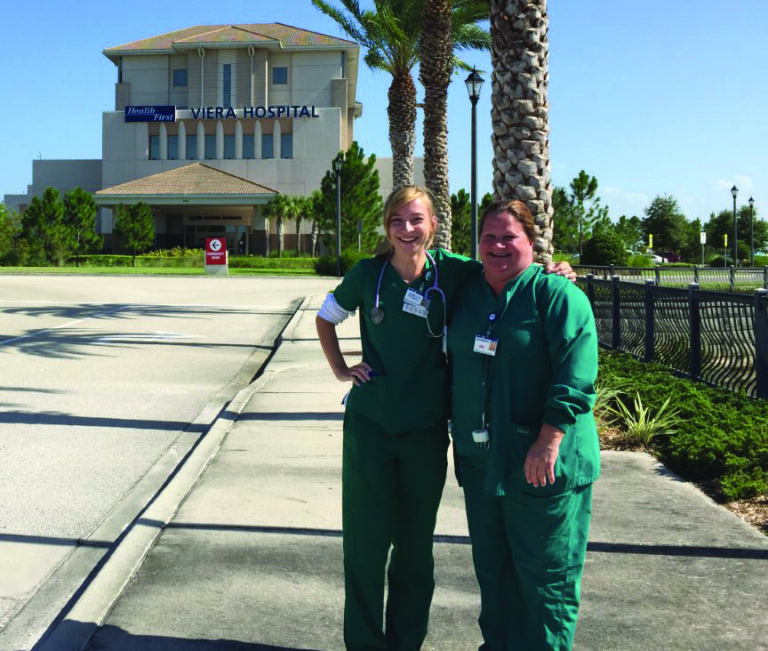By J. Morgan ’91
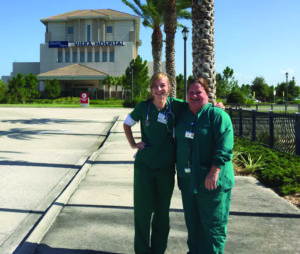
“Baby Bird, this is you,” said the supervising nurse. Those simple words propelled Jesicca O’Quinn ’17, nicknamed Baby Bird by her co-workers, one step farther into the life of a practicing nurse. A patient experiencing cardiac arrest had been admitted in the Viera Hospital emergency room and she was helping treat him. Though she had spent years training for the role, Jesicca admits performing CPR was a revelation: “There is no other feeling in the world like that—you are literally helping a person stay alive,” she said.
But how does a 22-year-old from the tiny town of Haysi, Virginia, find herself in the position to attempt to save a life in a hospital in Melbourne, Florida? Like all nurses, hard work, intelligence, and determination certainly played a role, but so did the support and guidance provided by Berea College’s nursing program.
Of course, a liberal arts education forms the backbone of any course of study at Berea, but students in the nursing program benefit from a challenging blend of classwork and field experiences. It has been the increasing emphasis on providing real-world experience that has led to a greater number of students, including Jesicca and her 2017 classmates Amy Angevine, Chioma Amaechi, twins Kiona and Kirsten Davis, Trinity Goodman, Kendra Messer, Marian Popa, and Yunpeng “Ray” Xia, to seek internships during the summer before their senior year. Internships are increasingly seen as an important step in the process of joining the profession. Incidentally, nursing is the most respected profession in America according to a 2015 Gallup poll which found that nurses rank as the most honest, ethical professionals for the 14th straight year. As the largest segment of the health care workforce, nurses play a key role in improving America’s health care system.
Classes and Clinicals
To understand how Berea’s program educates students both for the day-to-day challenges of nursing and for the opportunities this expanding field offers, we can start by looking at the balance struck between classwork and practical experience. Indeed, the discipline is increasingly an example of the liberal arts ideal of “praxis,” where theory and practice develop together to mutually inform the students’ growth.
During the first year, traditional classes like anatomy and physiology (A&P), psychology, and microbiology establish a base of knowledge that nursing students carry into the field. The rigor of the classes also establishes the level of commitment it will take to succeed in the program. Kiona Davis ’17 put it best when she said, “There’s no taking A&P for fun; you better be in it to win it.”
As an added challenge, in the second year of the nursing program, students spend several hours per week in clinical experiences at a variety of local health facilities. The clinical settings continue every semester and can range from nursing homes and addiction recovery centers to traditional hospital settings. These field experiences, called clinicals, allow students to do much more than fine-tune techniques for applying bandages or taking blood pressure; they directly involve students with the greatest source of challenge and joy in nursing: patients. Dr. Monica Kennison, Susan V. Clayton Chair of Nursing, says, “Clinical experiences are intentionally structured so that nursing students not only become stellar nurses, but also nurses that employers and patients request. In clinical experiences, nursing students practice the knowledge, skills, and attitudes they learn in the classroom and actively engage in making clinical judgments to the betterment of their patients. In turn, patients make indelible impressions on students. To this day, I still vividly remember Mrs. E., a surgical patient I cared for when I was a nursing student over 30 years ago. Caring for her taught me how to notice subtle signs of internal bleeding and implement a rapid response.”
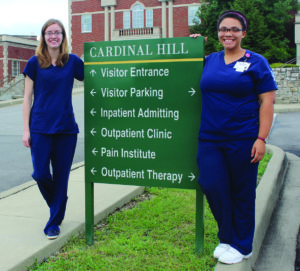
Despite the challenges inside and outside the classroom, nursing remains a popular choice of major among incoming students. Many students choose nursing because they have heard, often from family members, that it is a good career choice due to the high demand for qualified nurses. Changes in the health care system will likely create an increased demand for nurses in the next 20 years, so plenty of people have been attracted to the field because it offers the prospect of long-term job security. “You make good money as a nurse,” says Jesicca, “but you won’t be happy unless you want to help.”
Graduating senior nursing students, like Chioma Amaechi, were drawn to the field for reasons other than money: “Serving God has always been important to me, and I was looking for a way to serve His people.” Chioma admits that at first she was not passionate about the classwork. Once clinicals began, “I started to love it.” Clinicals allowed her to form strong relationships with some of her patients.
“Reaching a patient who needed me, helped me realize how important nursing is,” said Chioma. In clinical practice, we “learn to see the world from the patient’s point of view and this helps [us] learn how to treat them.” For instance, Chioma explains that instead of focusing on the fact that patients may not be taking their medicine, we need to dig deeper and figure out why that is happening. “You can’t focus on the fact that they aren’t taking their medicine,” she said. “You must learn why they don’t want to take the medicine.”
While working at the Veterans Administration (VA) hospital, Chioma experienced the depth of connection that nurses can create when she met a patient who had withdrawn from the world. Being the only African-American on the ward led him to feel socially isolated. As an African American herself, Chioma felt a connection: “He was special to me because he reminded me of my own father.” During her time at the VA, she made a point of engaging him, and, slowly, she said, “he opened up. He talked and smiled more, and eventually asked if I would shave his face.” This demonstration of trust on his part affirmed for her the real importance of nursing.
In other cases, the students build powerful connections quickly. Marian Popa, for example, found that being fully present in a single moment can be enough to make a difference in a patient’s care. He recalled a clinical experience at a regional hospital where he spent time on the intensive care unit. One evening, he said, “I was taking care of a lady whose mental state was pretty bad, but just talking to her in that critical moment comforted her. I knew I had made a difference when she smiled.”
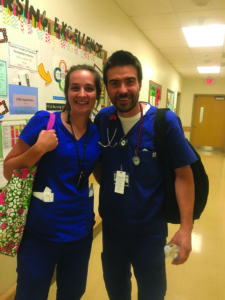
For many students, the highlight of the clinical experience comes in the last year, when the labor and delivery rotation occurs. “I saw three deliveries in the last month,” said Jesicca, “and each time, I’m saying, ‘Go, mom, go!’” Though, like many students, Jesicca looked forward to helping with the newborns, she learned that caring for the new mothers is just as rewarding: “I like being this little voice coaching the mom on what to do.”
“We were much more confident after clinicals, confident in our skills including the ability to communicate with patients and their families,” said Jesicca.
Summer Internships
During the summer before their junior or senior year, nursing students at Berea have the opportunity to put their skills to the test by spending eight to ten weeks working full time at a medical facility, an experience that gives them a fuller picture of what a career in nursing will be like.
Thanks to the Internship Program and the generosity of donors, the opportunity for Berea College students to pursue summer internships has increased in the last five years. Without this funding, internship experiences would be extremely limited, since positions are often unpaid by the employer and students lack the financial resources to cover their travel and living expenses during the experience. According to Esther Livingston, director of internships, “The College understands the value of internships that enable students to gain skills, make networking connections, and obtain career-related experience. Those outcomes are particularly important for Berea students who may not have the connections that students from more affluent families have. I consider internships to be pivotal experiences for students, and the responses that students provide in the evaluations of their experiences confirm the impact, both professionally and personally.”
Nursing students are doubly fortunate as Dr. Ronald Trense and Ms. Elayne Nord established the Waters Memorial Nursing Internship fund in 2012. In addition to a stipend that covers living expenses, the fund provides support for uniforms and professional dress. From 2012-2015, the Waters Memorial Internship funded nursing student internships at a rehabilitation facility in Asheville, North Carolina. In summer 2016, the internship occurred at Cardinal Hill Rehabilitation Hospital in Lexington, Kentucky.
“It’s so rewarding to have patients and know that what you did had an impact on their lives. At Cardinal Hill, I worked with paraplegic and quadriplegic patients,” said Kiona, and often the most important part was connecting to them as people, not as patients.
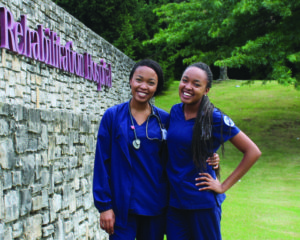
Kiona’s sister, Kirsten, also spent the summer at Cardinal Hill. Working on the spinal care unit was her favorite part of the internship because her supervising nurse built her confidence. “She let me be really hands-on. She would show me a technique, make sure I knew how to do it, then trusted me to work with the patient alone.” The experience also gave her a renewed respect for the complexity of the work done by nurses and the broad range of information and skills they must draw upon. “I learned you can’t know it all, that there’s always more to learn,” and she is certainly up for the challenge of being a life-long learner.
The internships also give students a bit of a reality check about the working lives of nurses. In addition to facing long work hours (12-hour days are the norm), challenging situations, and a variety of emotions, the interns learned a great deal about paperwork, and that keeping up with medical charts is just the half of it. “I didn’t realize how big a role health insurance plays in the health care system. You have to go by insurance rules as you develop patient care. If you don’t think a patient is ready to go home yet, but the insurance company says they are preparing to stop payment, you have to prove to them that the patient still needs care,” said Kiona.
All the students interviewed agreed that the internship experience gave them a much fuller idea of what a career in nursing will be like and increased their confidence in the skills learned at Berea. Just as importantly, the internship can make a significant difference in launching a career. “It shows potential employers that you are ready for the job because you have experience doing the work of nursing. It shows you will be a better, faster learner than another candidate,” says Klara Aminova ’15. Klara, who participated in the Waters Memorial Internship during the summer of 2014, credits the internship with giving her a leg up during her job search in Atlanta, Georgia. “It was the internship that set me apart and helped me get a residency at Emory,” she said.
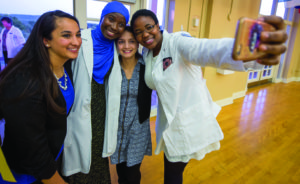
No matter if it is the rigorous coursework and the hectic schedules, or patients needing acute care or a caring hand, these student nurses are not only ready for the challenge, they are inspired by it—inspired and willing to use their talents to serve all members of the community.


